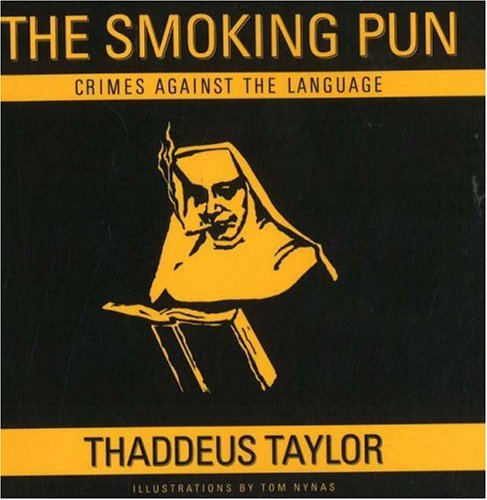Items related to The Smoking Pun: Crimes Against the Language

Synopsis
"synopsis" may belong to another edition of this title.
About the Author
"About this title" may belong to another edition of this title.
FREE shipping within U.S.A.
Destination, rates & speedsSearch results for The Smoking Pun: Crimes Against the Language
The Smoking Pun: Crimes Against the Language
Seller: ThriftBooks-Atlanta, AUSTELL, GA, U.S.A.
Paperback. Condition: Very Good. No Jacket. May have limited writing in cover pages. Pages are unmarked. ~ ThriftBooks: Read More, Spend Less 0.45. Seller Inventory # G0977046907I4N00
Quantity: 1 available
The Smoking Pun: Crimes Against the Language
Seller: Wonder Book, Frederick, MD, U.S.A.
Condition: Very Good. Signed Copy . Signed by author on title page. Seller Inventory # SB10M-00106
Quantity: 1 available
The Smoking Pun: Crimes Against the Language Taylor, Thaddeus and Nynas, Tom
Seller: Hay-on-Wye Booksellers, Hay-on-Wye, HEREF, United Kingdom
Condition: Fine. Seller Inventory # 79569-5
Quantity: 1 available
The Smoking Pun: Crimes Against the Language Taylor, Thaddeus and Nynas, Tom
Seller: Hay-on-Wye Booksellers, Hay-on-Wye, HEREF, United Kingdom
Condition: Good. New/unused. Laminate lifting on rear cover. Gentle storage wear to corners. Contents unread. Seller Inventory # 004419-3
Quantity: 1 available
The Smoking Pun: Crimes Against the Language Taylor, Thaddeus and Nynas, Tom
Seller: Hay-on-Wye Booksellers, Hay-on-Wye, HEREF, United Kingdom
Condition: As New. Seller Inventory # HP-2705
Quantity: 1 available
The Smoking Pun: Crimes Against the Language Taylor, Thaddeus and Nynas, Tom
Seller: Hay-on-Wye Booksellers, Hay-on-Wye, HEREF, United Kingdom
Condition: As New. Seller Inventory # HP-13098
Quantity: 1 available
The Smoking Pun: Crimes Against the Language
Seller: Ground Zero Books, Ltd., Silver Spring, MD, U.S.A.
Trade paperback. Nynas, Tom (illustrator). [2], 105, [5] p. Illustrations. This collection of 44 puns, each accompanied by a funny illustration, analyzes in endnotes the origins, roots, prefixes, suffixes, and linguistic peculiarities of certain punned words. Tricky twists turn phrases such as "religiously ambivalent" into "either-or-thodox, " and illuminating notes explain how such phrases as "no stone unturned" mutated from the darker "no bones unburned, " which refers to the digging up and destroying of the bones of people posthumously convicted of heresy. Readers are also invited to submit their own puns using mail-in forms at the back of the book. From Wikipedia: "The pun, also called paronomasia, is a form of word play which suggests two or more meanings, by exploiting multiple meanings of words, or of similar-sounding words, for an intended humorous or rhetorical effect. These ambiguities can arise from the intentional use and abuse of homophonic, homographic, metonymic, or metaphorical language. A pun differs from a malapropism in that a malapropism uses an incorrect expression that alludes to another (usually correct) expression, but a pun uses a correct expression that alludes to another (sometimes correct but more often absurdly humorous) expression. Henri Bergson defined a pun as a sentence or utterance in which "two different sets of ideas are expressed, and we are confronted with only one series of words". Puns may be regarded as in-jokes or idiomatic constructions, given that their usage and meaning are entirely local to a particular language and its culture. For example, camping is intense (in tents). Puns are used to create humor and sometimes require a large vocabulary to understand. Puns have long been used by comedy writers, such as William Shakespeare, Oscar Wilde, and George Carlin. The Roman playwright Plautus is famous for his tendency to make up and change the meaning of words to create puns in Latin." Very good. Signed by previous owner. Sticker residue on back cover over barcode. Several give inscriptions throughout. First edition. First edition [stated]. Presumed first printing. Seller Inventory # 66733
Quantity: 1 available
